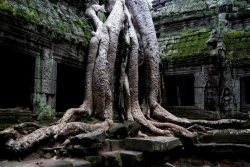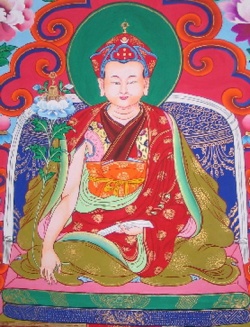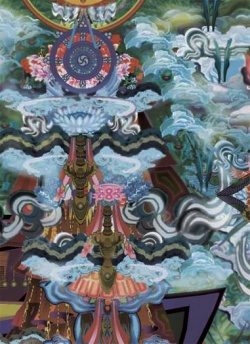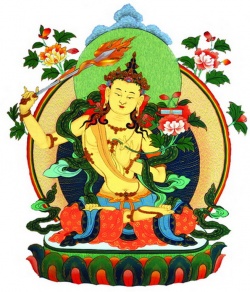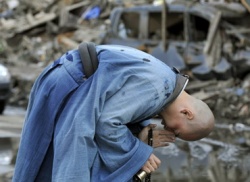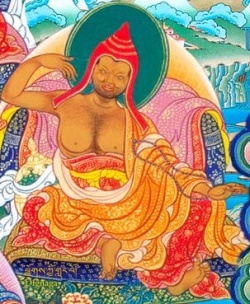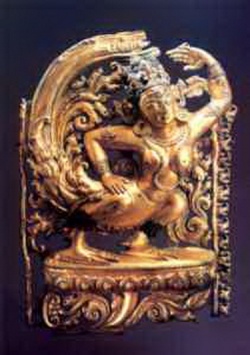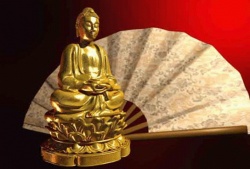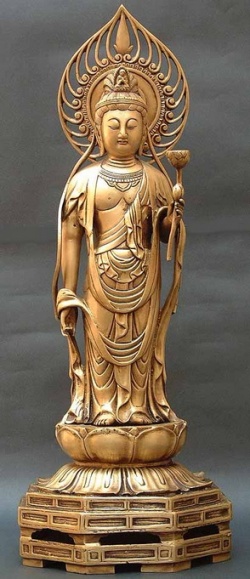Difference between revisions of "The Gospel of Buddha:Chapter 34: Visakha"
(Created page with "{{DisplayImages|295|202|1284|349|584|840|685|1104|706|12|492|1027}} Visakha, a wealthy woman in Savatthi<br/> who had many children and grandchildren,<br/> had given to the or...") |
|||
| Line 1: | Line 1: | ||
{{DisplayImages|295|202|1284|349|584|840|685|1104|706|12|492|1027}} | {{DisplayImages|295|202|1284|349|584|840|685|1104|706|12|492|1027}} | ||
| − | Visakha, a wealthy woman in Savatthi<br/> | + | [[Visakha]], a wealthy woman in [[Savatthi]]<br/> |
who had many children and grandchildren,<br/> | who had many children and grandchildren,<br/> | ||
| − | had given to the order the Pubbarama or Eastern Garden, and was the first in Northern Kosala<br/> | + | had given to the order the [[Pubbarama]] or Eastern Garden, and was the first in Northern [[Kosala]]<br/> |
to become a matron of the lay sisters. [1]<br/> | to become a matron of the lay sisters. [1]<br/> | ||
<br/> | <br/> | ||
| − | When the Blessed One stayed at Savatthi,<br/> | + | When the [[Blessed One]] stayed at [[Savatthi]],<br/> |
| − | Visakha went up to the place where the blessed One was,<br/> | + | [[Visakha]] went up to the place where the [[blessed One]] was,<br/> |
and tendered him an invitation to take his meal at her house,<br/> | and tendered him an invitation to take his meal at her house,<br/> | ||
| − | which the Blessed One accepted. [2]<br/> | + | which the [[Blessed One]] accepted. [2]<br/> |
<br/> | <br/> | ||
| − | And a heavy rain fell during the night and the next morning;<br/> | + | And a heavy [[rain]] fell during the night and the next morning;<br/> |
| − | and the bhikkhus doffed their robes to keep them dry<br/> | + | and the [[bhikkhus]] doffed their [[robes]] to keep them dry<br/> |
| − | and let the rain fall upon their bodies. [3]<br/> | + | and let the [[rain]] fall upon their [[bodies]]. [3]<br/> |
<br/> | <br/> | ||
| − | When on the next day the Blessed One had finished his meal,<br/> | + | When on the next day the [[Blessed One]] had finished his meal,<br/> |
she took her seat at his side and spoke thus:<br/> | she took her seat at his side and spoke thus:<br/> | ||
| − | "Eight are the boons, Lord, which I beg of the Blessed One." [4]<br/> | + | "Eight are the boons, [[Lord]], which I beg of the [[Blessed One]]." [4]<br/> |
<br/> | <br/> | ||
| − | Said the blessed One: "The Tathagatas, O Visakha,<br/> | + | Said the [[blessed One]]: "The [[Tathagatas]], O [[Visakha]],<br/> |
grant no boons until they know what they are." [5]<br/> | grant no boons until they know what they are." [5]<br/> | ||
<br/> | <br/> | ||
| − | Visakha replied: "Befitting, Lord,<br/> | + | [[Visakha]] replied: "Befitting, [[Lord]],<br/> |
and unobjectionable are the boons I ask." [6]<br/> | and unobjectionable are the boons I ask." [6]<br/> | ||
<br/> | <br/> | ||
| − | Having received permission to make known her requests, Visakha said:<br/> | + | Having received permission to make known her requests, [[Visakha]] said:<br/> |
| − | "I desire, Lord, through all my life long<br/> | + | "I [[desire]], [[Lord]], through all my [[life]] long<br/> |
| − | to bestow robes for the rainy season on the Sangha,<br/> | + | to bestow [[robes]] for the [[rainy season]] on the [[Sangha]],<br/> |
| − | and food for incoming bikkhus, and food for outgoing bhikkhus,<br/> | + | and [[food]] for incoming [[bikkhus]], and [[food]] for outgoing [[bhikkhus]],<br/> |
| − | and food for the sick, and food for those who wait upon the sick,<br/> | + | and [[food]] for the sick, and [[food]] for those who wait upon the sick,<br/> |
| − | and medicine for the sick, and a constant supply of rice-milk for the Sangha,<br/> | + | and [[medicine]] for the sick, and a [[constant]] supply of rice-milk for the [[Sangha]],<br/> |
| − | and bathing robes for the bhikkhunis, the sisters." [7]<br/> | + | and bathing [[robes]] for the [[bhikkhunis]], the sisters." [7]<br/> |
<br/> | <br/> | ||
| − | Said the Buddha: "But what circumstance is it, O Visakha,<br/> | + | Said the [[Buddha]]: "But what circumstance is it, O [[Visakha]],<br/> |
| − | that thou hast in view in asking these eight boons of the Tathagata?" [8]<br/> | + | that thou hast in [[view]] in asking these eight boons of the [[Tathagata]]?" [8]<br/> |
<br/> | <br/> | ||
| − | And Visakha replied: [9]<br/> | + | And [[Visakha]] replied: [9]<br/> |
<br/> | <br/> | ||
| − | "I gave command, Lord, to my maid-servant, saying,<br/> | + | "I gave command, [[Lord]], to my maid-servant, saying,<br/> |
'Go, and announce to the brotherhood that the meal is ready.'<br/> | 'Go, and announce to the brotherhood that the meal is ready.'<br/> | ||
| − | And the maid went, but when she came to the vihara,<br/> | + | And the maid went, but when she came to the [[vihara]],<br/> |
| − | she observed that the bhikkhus had doffed their robes while it was raining,<br/> | + | she observed that the [[bhikkhus]] had doffed their [[robes]] while it was raining,<br/> |
| − | and she thought: 'These are not bhikkhus,<br/> | + | and she [[thought]]: 'These are not [[bhikkhus]],<br/> |
| − | but naked ascetics letting the rain fall on them.'<br/> | + | but naked [[ascetics]] letting the [[rain]] fall on them.'<br/> |
So she returned to me and reported accordingly,<br/> | So she returned to me and reported accordingly,<br/> | ||
| − | and I had to send her a second time.<br/> | + | and I had to send her a second [[time]].<br/> |
| − | Impure, Lord, is nakedness, and revolting.<br/> | + | Impure, [[Lord]], is nakedness, and revolting.<br/> |
| − | It was this circumstance, Lord, that I had in view<br/> | + | It was this circumstance, [[Lord]], that I had in [[view]]<br/> |
| − | in desiring to provide the Sangha my life long<br/> | + | in [[desiring]] to provide the [[Sangha]] my [[life]] long<br/> |
| − | with special garments for use in the rainy season. [10]<br/> | + | with special garments for use in the [[rainy season]]. [10]<br/> |
<br/> | <br/> | ||
| − | "As to my second wish, Lord, an incoming bhikkhu,<br/> | + | "As to my second wish, [[Lord]], an incoming [[bhikkhu]],<br/> |
not being able to take the direct roads,<br/> | not being able to take the direct roads,<br/> | ||
| − | and not knowing the places where food can be procured,<br/> | + | and not [[knowing]] the places where [[food]] can be procured,<br/> |
| − | comes on his way tired out by seeking for alms.<br/> | + | comes on his way tired out by seeking for [[alms]].<br/> |
| − | It was this circumstance, Lord, that I had in view<br/> | + | It was this circumstance, [[Lord]], that I had in [[view]]<br/> |
| − | in desiring to provide the Sangha my life long<br/> | + | in [[desiring]] to provide the [[Sangha]] my [[life]] long<br/> |
| − | with food for incoming bhikkhus. [11]<br/> | + | with [[food]] for incoming [[bhikkhus]]. [11]<br/> |
<br/> | <br/> | ||
| − | "Thirdly, Lord, an outgoing bhikkhu,<br/> | + | "Thirdly, [[Lord]], an outgoing [[bhikkhu]],<br/> |
| − | while seeking about for alms, may be left behind,<br/> | + | while seeking about for [[alms]], may be left behind,<br/> |
| − | or may arrive too late at the place whither he desires to go,<br/> | + | or may arrive too late at the place whither he [[desires]] to go,<br/> |
and will set out on the road in weariness. [12]<br/> | and will set out on the road in weariness. [12]<br/> | ||
<br/> | <br/> | ||
| − | Fourthly, Lord, if a sick bhikkhu does not obtain suitable food,<br/> | + | Fourthly, [[Lord]], if a sick [[bhikkhu]] does not obtain suitable [[food]],<br/> |
| − | his sickness may increase upon him, and he may die. [13]<br/> | + | his [[sickness]] may increase upon him, and he may [[die]]. [13]<br/> |
<br/> | <br/> | ||
| − | Fifthly, Lord, a bhikkhu who is waiting upon the sick<br/> | + | Fifthly, [[Lord]], a [[bhikkhu]] who is waiting upon the sick<br/> |
| − | will lose his opportunity of going out to seek food for himself. [14]<br/> | + | will lose his opportunity of going out to seek [[food]] for himself. [14]<br/> |
<br/> | <br/> | ||
| − | "Sixthly, Lord, if a sick bhikkhu does not obtain suitable medicines,<br/> | + | "Sixthly, [[Lord]], if a sick [[bhikkhu]] does not obtain suitable {{Wiki|medicines}},<br/> |
| − | his sickness may increase upon him, and he may die. [15]<br/> | + | his [[sickness]] may increase upon him, and he may [[die]]. [15]<br/> |
<br/> | <br/> | ||
| − | "Seventhly, Lord, I have heard that the Blessed One has praised rice-milk,<br/> | + | "Seventhly, [[Lord]], I have heard that the [[Blessed One]] has praised rice-milk,<br/> |
| − | because it gives readiness of mind, dispels hunger and thirst;<br/> | + | because it gives readiness of [[mind]], dispels hunger and [[thirst]];<br/> |
| − | it is wholesome for the healthy as nourishment,<br/> | + | it is [[wholesome]] for the healthy as nourishment,<br/> |
| − | and for the sick as a medicine.<br/> | + | and for the sick as a [[medicine]].<br/> |
| − | Therefore I desire to provide the Sangha my life long<br/> | + | Therefore I [[desire]] to provide the [[Sangha]] my [[life]] long<br/> |
| − | with a constant supply of rice-milk. [16]<br/> | + | with a [[constant]] supply of rice-milk. [16]<br/> |
<br/> | <br/> | ||
| − | "Finally, Lord, the bhikkhunis are in the habit<br/> | + | "Finally, [[Lord]], the [[bhikkhunis]] are in the [[Wikipedia:Habit (psychology)|habit]]<br/> |
| − | of bathing in the river Achiravati with the courtesans,<br/> | + | of bathing in the [[river]] [[Achiravati]] with the courtesans,<br/> |
at the same landing place, and naked.<br/> | at the same landing place, and naked.<br/> | ||
| − | And the courtesans, Lord, ridicule the bhikkhunis, saying,<br/> | + | And the courtesans, [[Lord]], ridicule the [[bhikkhunis]], saying,<br/> |
| − | 'What is the good, ladies, of your maintaining chastity when you are young?<br/> | + | 'What is the good, ladies, of your maintaining {{Wiki|chastity}} when you are young?<br/> |
| − | When you are old, maintain chastity then;<br/> | + | When you are old, maintain {{Wiki|chastity}} then;<br/> |
| − | thus will you obtain both worldly pleasure and religious consolation.'<br/> | + | thus will you obtain both [[worldly]] [[pleasure]] and [[religious]] consolation.'<br/> |
| − | Impure, Lord, is nakedness for a woman, disgusting, and revolting. [17]<br/> | + | Impure, [[Lord]], is nakedness for a woman, disgusting, and revolting. [17]<br/> |
<br/> | <br/> | ||
| − | "These are the circumstances, Lord, that I had in view." [18]<br/> | + | "These are the circumstances, [[Lord]], that I had in [[view]]." [18]<br/> |
<br/> | <br/> | ||
| − | The Blessed One said:<br/> | + | The [[Blessed One]] said:<br/> |
"But what was the advantage<br/> | "But what was the advantage<br/> | ||
| − | you had in view for yourself, O Visakha,<br/> | + | you had in [[view]] for yourself, O [[Visakha]],<br/> |
| − | in asking the eight boons of the Tathagata?" [19]<br/> | + | in asking the eight boons of the [[Tathagata]]?" [19]<br/> |
<br/> | <br/> | ||
| − | Visakha replied: [20]<br/> | + | [[Visakha]] replied: [20]<br/> |
<br/> | <br/> | ||
| − | "Bhikkhus who have spent the rainy seasons in various places<br/> | + | "[[Bhikkhus]] who have spent the rainy seasons in various places<br/> |
| − | will come, Lord, to Savatthi to visit the Blessed One.<br/> | + | will come, [[Lord]], to [[Savatthi]] to visit the [[Blessed One]].<br/> |
| − | And on coming to the Blessed One they will ask, saying:<br/> | + | And on coming to the [[Blessed One]] they will ask, saying:<br/> |
| − | 'Such and such a bhikkhu, Lord, has died.<br/> | + | 'Such and such a [[bhikkhu]], [[Lord]], has [[died]].<br/> |
| − | What, now, is his destiny?'<br/> | + | What, now, is his [[destiny]]?'<br/> |
| − | Then will the Blessed One explain<br/> | + | Then will the [[Blessed One]] explain<br/> |
| − | that he has attained the fruits of conversion;<br/> | + | that he has attained the {{Wiki|fruits}} of [[conversion]];<br/> |
| − | that he has attained arahatship<br/> | + | that he has attained [[arahatship]]<br/> |
| − | or has entered Nirvana, as the case may be. [21]<br/> | + | or has entered [[Nirvana]], as the case may be. [21]<br/> |
<br/> | <br/> | ||
"And I, going up to them, will ask, 'Was that brother, Sirs,<br/> | "And I, going up to them, will ask, 'Was that brother, Sirs,<br/> | ||
| − | one of those who had formerly been at Savatthi?'<br/> | + | one of those who had formerly been at [[Savatthi]]?'<br/> |
| − | If they reply to me, 'He has formerly been at Savatthi,'<br/> | + | If they reply to me, 'He has formerly been at [[Savatthi]],'<br/> |
then shall I arrive at the conclusion,<br/> | then shall I arrive at the conclusion,<br/> | ||
| − | 'For a certainty did that brother enjoy either the robes for the rainy season,<br/> | + | 'For a certainty did that brother enjoy either the [[robes]] for the [[rainy season]],<br/> |
| − | or the food for the incoming bhikkhus,<br/> | + | or the [[food]] for the incoming [[bhikkhus]],<br/> |
| − | or the food for the outgoing bhikkhus,<br/> | + | or the [[food]] for the outgoing [[bhikkhus]],<br/> |
| − | or the food for the sick,<br/> | + | or the [[food]] for the sick,<br/> |
| − | or the food for those that wait upon the sick,<br/> | + | or the [[food]] for those that wait upon the sick,<br/> |
| − | or the medicine for the sick,<br/> | + | or the [[medicine]] for the sick,<br/> |
| − | or the constant supply of rice-milk.' [22]<br/> | + | or the [[constant]] supply of rice-milk.' [22]<br/> |
<br/> | <br/> | ||
"Then will gladness spring up within me;<br/> | "Then will gladness spring up within me;<br/> | ||
| − | thus gladdened, joy will come to me;<br/> | + | thus gladdened, [[joy]] will come to me;<br/> |
| − | and so rejoicing all my mind will be at peace.<br/> | + | and so [[rejoicing]] all my [[mind]] will be at [[peace]].<br/> |
| − | Being thus at peace I shall experience a blissful feeling of content;<br/> | + | Being thus at [[peace]] I shall [[experience]] a blissful [[feeling]] of content;<br/> |
| − | and in that bliss my heart will be at rest.<br/> | + | and in that [[bliss]] my [[heart]] will be at rest.<br/> |
| − | That will be to me an exercise of my moral sense,<br/> | + | That will be to me an exercise of my [[moral]] [[sense]],<br/> |
| − | an exercise of my moral powers,<br/> | + | an exercise of my [[moral]] [[powers]],<br/> |
| − | an exercise of the seven kinds of wisdom!<br/> | + | an exercise of the seven kinds of [[wisdom]]!<br/> |
| − | This, Lord, was the advantage I had in view for myself<br/> | + | This, [[Lord]], was the advantage I had in [[view]] for myself<br/> |
| − | in asking those eight boons of the Blessed One." [23]<br/> | + | in asking those eight boons of the [[Blessed One]]." [23]<br/> |
<br/> | <br/> | ||
| − | The Blessed One said: "It is well, it is well, Visakha.<br/> | + | The [[Blessed One]] said: "It is well, it is well, [[Visakha]].<br/> |
Thou hast done well in asking these eight boons<br/> | Thou hast done well in asking these eight boons<br/> | ||
| − | of the Tathagata with such advantages in view.<br/> | + | of the [[Tathagata]] with such advantages in [[view]].<br/> |
| − | Charity bestowed upon those who are worthy of it<br/> | + | [[Charity]] bestowed upon those who are [[worthy]] of it<br/> |
| − | is like food seed sown on a good soil that yields an abundance of fruits.<br/> | + | is like [[food]] seed sown on a good soil that yields an abundance of {{Wiki|fruits}}.<br/> |
| − | But alms given to those who are yet under the tyrannical yoke of the passions<br/> | + | But [[alms]] given to those who are yet under the tyrannical yoke of the [[passions]]<br/> |
are like seed deposited in a bad soil.<br/> | are like seed deposited in a bad soil.<br/> | ||
| − | The passions of the receiver of the alms choke, as it were,<br/> | + | The [[passions]] of the receiver of the [[alms]] choke, as it were,<br/> |
| − | the growth of merits." [24]<br/> | + | the growth of [[merits]]." [24]<br/> |
<br/> | <br/> | ||
| − | And the Blessed One gave thanks to Visakha in these verses: [25]<br/> | + | And the [[Blessed One]] gave thanks to [[Visakha]] in these verses: [25]<br/> |
<br/> | <br/> | ||
| − | :"O noble woman of an upright life,<br/> | + | :"O [[noble]] woman of an upright [[life]],<br/> |
| − | :Disciple of the Blessed One, thou givest<br/> | + | :[[Disciple]] of the [[Blessed One]], thou givest<br/> |
| − | :Unstintedly in purity of heart. [26]<br/> | + | :Unstintedly in [[purity]] of [[heart]]. [26]<br/> |
<br/> | <br/> | ||
| − | :"Thou spreadest joy, assuagest pain,<br/> | + | :"Thou spreadest [[joy]], assuagest [[pain]],<br/> |
| − | :And verily thy gift will be a blessing<br/> | + | :And verily thy [[gift]] will be a [[blessing]]<br/> |
:As well to many others as to thee." [27]<br/> | :As well to many others as to thee." [27]<br/> | ||
Latest revision as of 18:54, 31 December 2013
Visakha, a wealthy woman in Savatthi
who had many children and grandchildren,
had given to the order the Pubbarama or Eastern Garden, and was the first in Northern Kosala
to become a matron of the lay sisters. [1]
When the Blessed One stayed at Savatthi,
Visakha went up to the place where the blessed One was,
and tendered him an invitation to take his meal at her house,
which the Blessed One accepted. [2]
And a heavy rain fell during the night and the next morning;
and the bhikkhus doffed their robes to keep them dry
and let the rain fall upon their bodies. [3]
When on the next day the Blessed One had finished his meal,
she took her seat at his side and spoke thus:
"Eight are the boons, Lord, which I beg of the Blessed One." [4]
Said the blessed One: "The Tathagatas, O Visakha,
grant no boons until they know what they are." [5]
Visakha replied: "Befitting, Lord,
and unobjectionable are the boons I ask." [6]
Having received permission to make known her requests, Visakha said:
"I desire, Lord, through all my life long
to bestow robes for the rainy season on the Sangha,
and food for incoming bikkhus, and food for outgoing bhikkhus,
and food for the sick, and food for those who wait upon the sick,
and medicine for the sick, and a constant supply of rice-milk for the Sangha,
and bathing robes for the bhikkhunis, the sisters." [7]
Said the Buddha: "But what circumstance is it, O Visakha,
that thou hast in view in asking these eight boons of the Tathagata?" [8]
And Visakha replied: [9]
"I gave command, Lord, to my maid-servant, saying,
'Go, and announce to the brotherhood that the meal is ready.'
And the maid went, but when she came to the vihara,
she observed that the bhikkhus had doffed their robes while it was raining,
and she thought: 'These are not bhikkhus,
but naked ascetics letting the rain fall on them.'
So she returned to me and reported accordingly,
and I had to send her a second time.
Impure, Lord, is nakedness, and revolting.
It was this circumstance, Lord, that I had in view
in desiring to provide the Sangha my life long
with special garments for use in the rainy season. [10]
"As to my second wish, Lord, an incoming bhikkhu,
not being able to take the direct roads,
and not knowing the places where food can be procured,
comes on his way tired out by seeking for alms.
It was this circumstance, Lord, that I had in view
in desiring to provide the Sangha my life long
with food for incoming bhikkhus. [11]
"Thirdly, Lord, an outgoing bhikkhu,
while seeking about for alms, may be left behind,
or may arrive too late at the place whither he desires to go,
and will set out on the road in weariness. [12]
Fourthly, Lord, if a sick bhikkhu does not obtain suitable food,
his sickness may increase upon him, and he may die. [13]
Fifthly, Lord, a bhikkhu who is waiting upon the sick
will lose his opportunity of going out to seek food for himself. [14]
"Sixthly, Lord, if a sick bhikkhu does not obtain suitable medicines,
his sickness may increase upon him, and he may die. [15]
"Seventhly, Lord, I have heard that the Blessed One has praised rice-milk,
because it gives readiness of mind, dispels hunger and thirst;
it is wholesome for the healthy as nourishment,
and for the sick as a medicine.
Therefore I desire to provide the Sangha my life long
with a constant supply of rice-milk. [16]
"Finally, Lord, the bhikkhunis are in the habit
of bathing in the river Achiravati with the courtesans,
at the same landing place, and naked.
And the courtesans, Lord, ridicule the bhikkhunis, saying,
'What is the good, ladies, of your maintaining chastity when you are young?
When you are old, maintain chastity then;
thus will you obtain both worldly pleasure and religious consolation.'
Impure, Lord, is nakedness for a woman, disgusting, and revolting. [17]
"These are the circumstances, Lord, that I had in view." [18]
The Blessed One said:
"But what was the advantage
you had in view for yourself, O Visakha,
in asking the eight boons of the Tathagata?" [19]
Visakha replied: [20]
"Bhikkhus who have spent the rainy seasons in various places
will come, Lord, to Savatthi to visit the Blessed One.
And on coming to the Blessed One they will ask, saying:
'Such and such a bhikkhu, Lord, has died.
What, now, is his destiny?'
Then will the Blessed One explain
that he has attained the fruits of conversion;
that he has attained arahatship
or has entered Nirvana, as the case may be. [21]
"And I, going up to them, will ask, 'Was that brother, Sirs,
one of those who had formerly been at Savatthi?'
If they reply to me, 'He has formerly been at Savatthi,'
then shall I arrive at the conclusion,
'For a certainty did that brother enjoy either the robes for the rainy season,
or the food for the incoming bhikkhus,
or the food for the outgoing bhikkhus,
or the food for the sick,
or the food for those that wait upon the sick,
or the medicine for the sick,
or the constant supply of rice-milk.' [22]
"Then will gladness spring up within me;
thus gladdened, joy will come to me;
and so rejoicing all my mind will be at peace.
Being thus at peace I shall experience a blissful feeling of content;
and in that bliss my heart will be at rest.
That will be to me an exercise of my moral sense,
an exercise of my moral powers,
an exercise of the seven kinds of wisdom!
This, Lord, was the advantage I had in view for myself
in asking those eight boons of the Blessed One." [23]
The Blessed One said: "It is well, it is well, Visakha.
Thou hast done well in asking these eight boons
of the Tathagata with such advantages in view.
Charity bestowed upon those who are worthy of it
is like food seed sown on a good soil that yields an abundance of fruits.
But alms given to those who are yet under the tyrannical yoke of the passions
are like seed deposited in a bad soil.
The passions of the receiver of the alms choke, as it were,
the growth of merits." [24]
And the Blessed One gave thanks to Visakha in these verses: [25]
- "O noble woman of an upright life,
- Disciple of the Blessed One, thou givest
- Unstintedly in purity of heart. [26]
- "Thou spreadest joy, assuagest pain,
- And verily thy gift will be a blessing
- As well to many others as to thee." [27]
Continue Reading
- The Gospel of Buddha: Preface
- The Gospel of Buddha:Chapter 01: Rejoice
- The Gospel of Buddha:Chapter 02: Samsara and Nirvana
- The Gospel of Buddha:Chapter 03: Truth the Saviour
- The Gospel of Buddha:Chapter 04: The Bodhisatta's Birth
- The Gospel of Buddha:Chapter 05: The Ties of Life
- The Gospel of Buddha:Chapter 06: The Three Woes
- The Gospel of Buddha:Chapter 07: The Bodhisatta's Renunciation
- The Gospel of Buddha:Chapter 08: King Bimbisara
- The Gospel of Buddha:Chapter 09: The Bodhisatta's Search
- The Gospel of Buddha:Chapter 10: Uruvela, the Place of Mortification
- The Gospel of Buddha:Chapter 11: Mara, the Evil One
- The Gospel of Buddha:Chapter 12: Enlightenment
- The Gospel of Buddha:Chapter 13: The First Converts
- The Gospel of Buddha:Chapter 14: Brahma's Request
- The Gospel of Buddha:Chapter 15: Upaka
- The Gospel of Buddha:Chapter 16: The Sermon at Benares
- The Gospel of Buddha:Chapter 17: The Sangha
- The Gospel of Buddha:Chapter 18: Yasa, the Youth of Benares
- The Gospel of Buddha:Chapter 19: Kassapa
- The Gospel of Buddha:Chapter 20: The Sermon at Rajagaha
- The Gospel of Buddha:Chapter 21: The King's Gift
- The Gospel of Buddha:Chapter 22: Sariputta and Moggallana
- The Gospel of Buddha:Chapter 23: Anathapindika
- The Gospel of Buddha:Chapter 24: The Sermon on Charity
- The Gospel of Buddha:Chapter 25: Jetavana
- The Gospel of Buddha:Chapter 26: The Three Characteristics and the Uncreate
- The Gospel of Buddha:Chapter 27: The Buddha's Father
- The Gospel of Buddha:Chapter 28: Yasodhara
- The Gospel of Buddha:Chapter 29: Rahula
- The Gospel of Buddha:Chapter 30: Jivaka, the Physician
- The Gospel of Buddha:Chapter 31: The Buddha's Parents Attain Nirvana
- The Gospel of Buddha:Chapter 32: Women Admitted to the Sangha
- The Gospel of Buddha:Chapter 33: The Bhikkhus' Conduct Toward Women
- The Gospel of Buddha:Chapter 34: Visakha
- The Gospel of Buddha:Chapter 35: The Uposatha and Patimokkha
- The Gospel of Buddha:Chapter 36: The Schism
- The Gospel of Buddha:Chapter 37: The Re-establishment of Concord
- The Gospel of Buddha:Chapter 38: The Bhikkhus Rebuked
- The Gospel of Buddha:Chapter 39: Devadatta
- The Gospel of Buddha:Chapter 40: Name and Form
- The Gospel of Buddha:Chapter 41: The Goal
- The Gospel of Buddha:Chapter 42: Miracles Forbidden
- The Gospel of Buddha:Chapter 43: The Vanity of Worldliness
- The Gospel of Buddha:Chapter 44: Secrecy and Publicity
- The Gospel of Buddha:Chapter 45: The Annihilation of Suffering
- The Gospel of Buddha:Chapter 46: Avoiding the Ten Evils
- The Gospel of Buddha:Chapter 47: The Preacher's Mission
- The Gospel of Buddha:Chapter 48: The Dhammapada
- The Gospel of Buddha:Chapter 49: The Two Brahmans
- The Gospel of Buddha:Chapter 50: Guard the Six Quarters
- The Gospel of Buddha:Chapter 51: Simha's Question Concerning Annihilation
- The Gospel of Buddha:Chapter 52: All Existence is Spiritual
- The Gospel of Buddha:Chapter 53: Identity and Non-Identity
- The Gospel of Buddha:Chapter 54: The Buddha Omnipresent
- The Gospel of Buddha:Chapter 55: One Essence, One Law, One Aim
- The Gospel of Buddha:Chapter 56: The Lesson Given to Rahula
- The Gospel of Buddha:Chapter 57: The Sermon on Abuse
- The Gospel of Buddha:Chapter 58: The Buddha Replies to the Deva
- The Gospel of Buddha:Chapter 59: Words of Instruction
- The Gospel of Buddha:Chapter 60: Amitabha
- The Gospel of Buddha:Chapter 61: The Teacher Unknown
- The Gospel of Buddha:Chapter 62: Parables
- The Gospel of Buddha:Chapter 63: The Widow's Two Mites and the Parable of the Three Merchants
- The Gospel of Buddha:Chapter 64: The Man Born Blind
- The Gospel of Buddha:Chapter 65: The Lost Son
- The Gospel of Buddha:Chapter 66: The Giddy Fish
- The Gospel of Buddha:Chapter 67: The Cruel Crane Outwitted
- The Gospel of Buddha:Chapter 68: Four Kinds of Merit
- The Gospel of Buddha:Chapter 69: The Light of the World
- The Gospel of Buddha:Chapter 70: Luxurious Living
- The Gospel of Buddha:Chapter 71: The Communication of Bliss
- The Gospel of Buddha:Chapter 72: The Listless Fool
- The Gospel of Buddha:Chapter 73: Rescue in the Desert
- The Gospel of Buddha:Chapter 74: The Sower
- The Gospel of Buddha:Chapter 75: The Outcast
- The Gospel of Buddha:Chapter 76: The Woman at the Well
- The Gospel of Buddha:Chapter 77: The Peacemaker
- The Gospel of Buddha:Chapter 78: The Hungry Dog
- The Gospel of Buddha:Chapter 79: The Despot
- The Gospel of Buddha:Chapter 80: Vasavadatta
- The Gospel of Buddha:Chapter 81: The Marriage-Feast in Jambunada
- The Gospel of Buddha:Chapter 82: A Party in Search of a Thief
- The Gospel of Buddha:Chapter 83: In the Realm of Yamaraja
- The Gospel of Buddha:Chapter 84: The Mustard Seed
- The Gospel of Buddha:Chapter 85: Following the Master Over the Stream
- The Gospel of Buddha:Chapter 86: The Sick Bhikkhu
- The Gospel of Buddha:Chapter 87: The Patient Elephant
- The Gospel of Buddha:Chapter 88: The Conditions of Welfare
- The Gospel of Buddha:Chapter 89: Sariputta's Faith
- The Gospel of Buddha:Chapter 90: Pataliputta
- The Gospel of Buddha:Chapter 91: The Mirror of Truth
- The Gospel of Buddha:Chapter 92: Ambapali
- The Gospel of Buddha:Chapter 93: The Buddha's Farewell Address
- The Gospel of Buddha:Chapter 94: The Buddha Announces His Death
- The Gospel of Buddha:Chapter 95: Chunda, the Smith
- The Gospel of Buddha:Chapter 96: Metteyya
- The Gospel of Buddha:Chapter 97: The Buddha's Final Entering into Nirvana
- The Gospel of Buddha:Chapter 98: The Three Personalities of the Buddha
- The Gospel of Buddha:Chapter 99: The Purpose of Being
- The Gospel of Buddha:Chapter 100: The Praise of All the Buddhas

